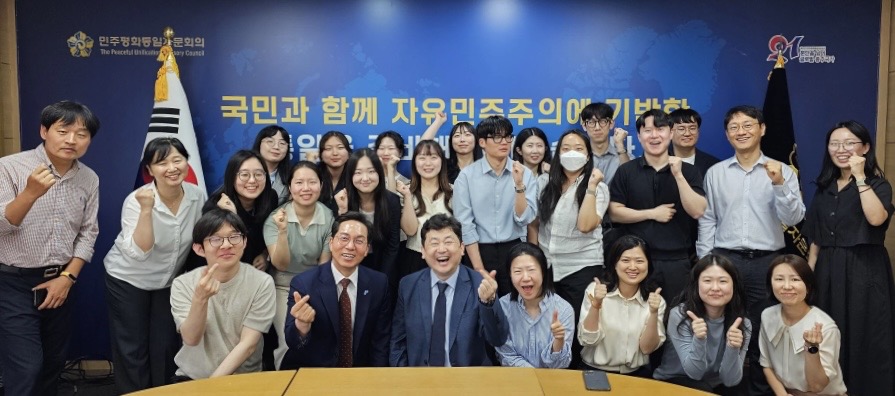
On May 29, 2024, Cyber Diplomacy Organization VANK held a Global Unification Public Diplomacy Strategy Seminar at the Peaceful Unification Advisory Council (PUAC) meeting room to discuss ways to raise awareness and interest in Korean unification both domestically and internationally.
The seminar brought together a total of 25 participants: VANK was represented by Director Park Ki-tae and nine youth researchers, while the PUAC sent Deputy Secretary Dong Seung-chul and 14 staff members responsible for overseas affairs.
During the seminar, VANK presented its global unification diplomacy activities conducted since its founding in 1999 through 2024.
Correcting International Misperceptions of Korean History
VANK highlighted its efforts to address distorted global perceptions of Korea’s long history prior to division. The organization shared examples of correcting inaccuracies in textbooks, encyclopedias, academic publications, and tourism websites that presented Korea as a Chinese colony or a tributary state, or misrepresented Korea as an independent nation for only a thousand years. Maps depicting Korea as part of China were also corrected. Through these initiatives, VANK has corrected approximately 731 globally influential publications and platforms, including National Geographic, Harvard University, BBC, and WHO, ensuring accurate representation of Korean history, geography, and territory.
Promoting a Positive Image of Korea
VANK also focused on improving the global image of divided Korea. Worldwide, history textbooks devote only one page to Korea, compared to about 50 pages for China and 20 pages for Japan. This single page often emphasizes invasions, subjugation, or Korea as a Chinese or Japanese tributary, negatively affecting Korea’s national image.
To counter this, VANK trained Korean youth as cyber diplomats and global Korea ambassadors to correct erroneous information in textbooks. The organization also promoted a more complete and positive portrayal of Korea’s history and culture through digital campaigns. Over 200 types of promotional materials—including English-language books, maps, and postcards totaling 1.9 million copies—were distributed globally to schools, organizations, and institutions.
Global Public Diplomacy for Korean Unification
VANK’s global unification public diplomacy campaign educates international audiences about the significance of Korean unification, promotes Korea’s national brand, and builds awareness and support. Approximately 1,075 Korean youth participated in the Global Unification Public Diplomacy Ambassador Program, with 235 outstanding participants producing unification-related materials and sharing them with international audiences.
VANK produced and distributed around 100,000 copies of unification promotional materials, including unification maps, Northeast Asia peace maps, global unification maps, public diplomacy guides, and “The Protagonists of Unified Korea” career guides for Korean youth. Popular materials, such as the “Unified Global Map,” illustrate how Korean unification connects to the world’s 8 billion people across 200 countries, fostering global support and understanding.
The public diplomacy maps provide guidance for youth conducting diplomacy with neighboring powers, including the U.S., China, Russia, and Japan, while career postcards demonstrate how various professions—from electrical engineers to journalists and environmental activists—can contribute to a unified Korea’s development.
Recognizing that global youth engage heavily with digital media, VANK also produced 12 videos introducing unified Korea. Notable examples include Building Bricks of Hope for Korean Unification, which encourages youth to reflect on the past, present, and future in preparation for unification, and The Meaning of This Country, which emphasizes the significance of the Korean Peninsula and the lives of North Korean citizens.
Future Campaigns and Youth Engagement
VANK announced new campaigns for 2024, including a national branding contest for unified Korea, AI-based visions of a unified future using ChatGPT and MidJourney, tailored advocacy strategies for the U.S., China, Japan, and Russia, and programs to cultivate global Korea ambassadors among both North Korean youth in South Korea and the global Korean diaspora. Video production and promotional campaigns targeting domestic youth awareness are also planned.
VANK youth researchers proposed additional strategies to PUAC, emphasizing the importance of training youth for unification diplomacy, utilizing metaverse platforms for cross-border engagement, leveraging Instagram to reach young audiences, and creating a public platform for youth to propose unification policies, akin to VANK’s Woollim policy site. Several researchers noted that current generational attitudes toward unification reflect both domestic priorities and feelings of helplessness in response to ongoing North Korean provocations, suggesting that outreach efforts must first address these perceptions to cultivate engagement.
PUAC Response
Deputy Secretary Dong Seung-chul expressed support for youth initiatives, stating, “Adults have a responsibility to provide vision and hope. While the PUAC is an advisory body and not directly responsible for policy implementation, we will explore ways to broaden consensus and promote peaceful unification. We are pleased to have VANK as a partner on this path.”
PUAC staff also praised VANK’s contributions, noting that the organization’s independent status and youth-driven activities complement PUAC’s efforts to expand public engagement and foster international interest in Korean unification. The collaboration is expected to strengthen ties with global Junior PUAC members and utilize digital tools, including AI, to envision the future of a unified Korea.